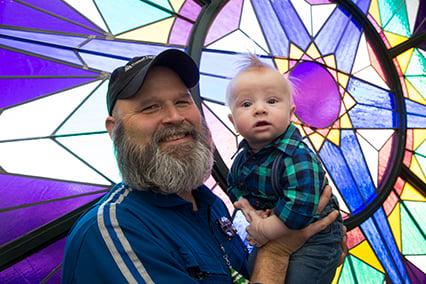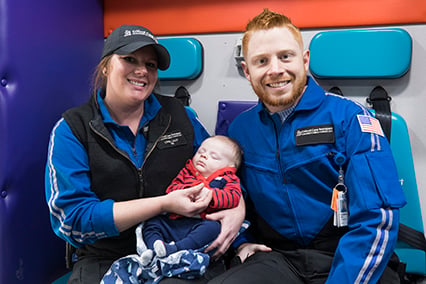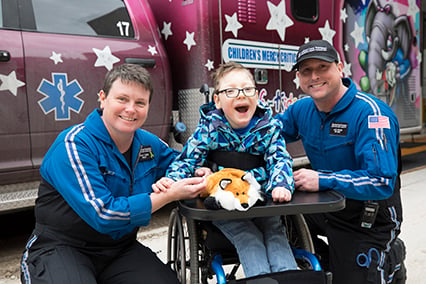Critical Care Transport: Paizlee's Story
Saturday, July 14, 2018, was just another busy summer day in Ft. Scott, Kan., for the Crumby family. Mom Stephanie was playing in a softball game, and her team was up to bat.
“My daughters, Paizlee and Jaidyn, came into the dugout to get some money for a snack,” Stephanie said. “Paizlee was just standing there when a pitch was overthrown, hitting her in the head.”
Immediately, Paizlee dropped to the ground. Stephanie scooped her 6-year-old daughter up in her arms. Though she couldn’t feel any swelling externally, Stephanie suspected Paizlee might have an internal head injury, and called 911.
As the local ambulance took her from the ball field to Ft. Scott’s Mercy Hospital, Paizlee’s eyes fixated and she began seizing. In the emergency room, a physician detected swelling in her brain, and called the Children’s Mercy Critical Care Transport team for help.
Initially, a Children’s Mercy ground ambulance crew arrived to take Paizlee to Kansas City, as the weather was not favorable for air travel.
“When the ground crew saw Paizlee, they called for the Children’s Mercy helicopter,” Stephanie said. “Her brain was swelling internally, causing pressure to build up in her skull.”
With an improvement in weather conditions and the helicopter en route, the team prepared Paizlee for the flight.
“The team reassured us they would rush her into surgery as soon as they arrived, and they tried to comfort me. I felt she was in good hands,” Stephanie said.
As soon as the helicopter landed, Paizlee was ready to go. The team lifted off a few minutes later, headed for the Children’s Mercy Adele Hall campus. In the meantime, the Crumby family anxiously drove to the hospital.
“Paizlee was already in surgery when we arrived. To relieve the pressure from the blood clot, the surgeon had to remove the whole right side of her skull, from the middle of her forehead to her right ear,” Stephanie described.
A few days later, the transport team stopped by the Pediatric Intensive Care Unit to visit Paizlee.
“We couldn’t believe they came to check on her,” Stephanie said. “The ground team that insisted she be flown to the hospital probably saved her life. I really don’t think she would have made it by ambulance—she had so much swelling in her brain.”
In all, Paizlee was hospitalized from July 14 to Sept. 7. She’s endured three brain surgeries and extensive rehabilitation, but she hasn’t lost her sense of humor or bubbly personality. An active child, Paizlee can’t wait to get back to playing soccer and softball.
“Anyone who has ever met Paizlee will tell you she’ll steal your heart,” Stephanie said. “Words can’t express our gratitude for all the Children’s Mercy Transport team did for us. They were just exceptional.”
Inside Pediatrics: Zei's story
After a mysterious illness ravages Zei’s lungs and leaves her fighting for life, the critical care team re-invents its life support protocols to push the limits of medicine to give her a chance.
Critical Care Transport: Knox's story
A rare rash and inconsolable crying triggered a St. Joseph, Mo., mom to take her infant to the pediatrician; and then to Children’s Mercy via ground ambulance. Immediate treatment for scalded skin syndrome meant a brief hospital stay for Knox, who is heathy today.

Critical Care Transport: Matthew's story
Following the birth of their son, Matthew, first-time parents Natalie and Phillip Meznar noticed something was seriously wrong. Suffering from breathing issues, the Neonatal Transport team at Children's Mercy quickly transported Matthew to the hospital for care, where he was diagnosed with a rare condition called pulmonary arteriovenous malformation, or PAVM.

Critical Care Transport: Parker's story
Born six and one-half years ago at only 23 weeks, 5 days of gestation, and weighing l pound, 12 ounces, Parker McElroy’s mother, Kylie, said he is alive today thanks to the Children’s Mercy Neonatal Transport team.
